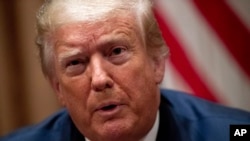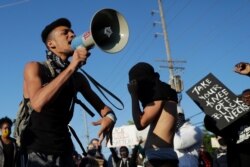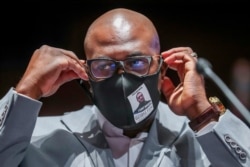U.S. President Donald Trump is set to meet with faith leaders, law enforcement officers and small business owners Thursday in Dallas, Texas, as he considers potential responses to nationwide protests that followed the death in police custody of African American man George Floyd.
The White House said the roundtable discussion would cover “solutions to historic economic, health and justice disparities in American communities.”
White House spokesperson Kayleigh McEnany told reporters Wednesday that both legislative proposals and executive orders are under consideration, and that the administration is looking to deliver them “in the coming days.”
One proposal Trump does not support is altering the so-called qualified immunity doctrine that helps shield law enforcement officers from civil lawsuits.
“That’s a nonstarter in the Democratic legislation,” McEnany said.
Leaders in the majority-Democrat House of Representatives have introduced legislation seeking overhauls in the country’s policing laws, aiming to broaden police accountability, track officers through a national police misconduct registry and end the practice of transferring military equipment to police departments across the nation.
The Republican-led Senate is working on its own package, and the Senate Judiciary Committee is set to hold a hearing on the issue next week.
The House Judiciary Committee held its own hearing Wednesday, at which Floyd’s brother, Philonise, urged lawmakers to approve legislation restricting the use of force by police.
City and state leaders have already instituted their own changes, including banning the use of chokeholds, pledging to shift funding from police departments to community programs, and setting up commissions to review complaints of police misconduct.
Crowds marched Wednesday in Boston, Oakland and elsewhere to voice their demands for defunding city police departments and reallocating the money for other programs.
Protesters assembled peacefully Wednesday in Seattle, the northwestern city where there had been repeated clashes between demonstrators and police in the earlier days of the protests.
Trump called the Seattle protesters “domestic terrorists” in a late Wednesday tweet repeating his often-used phrase “LAW & ORDER!” and threatened federal action as he criticized city and state leaders.
“Take back your city NOW. If you don’t do it, I will. This is not a game,” Trump said.
Seattle Mayor Jenny Durkan responded to the president with her own tweet: “Make us all safe. Go back to your bunker. #BlackLivesMatter”
More changes also came Wednesday in the city of Buffalo, New York, where Mayor Byron Brown announced he is introducing a Public Protection Unit to replace the police Emergency Response Team.
Members of the ERT were suspended after being seen on video shoving a 75-year-old protester who had to be hospitalized. Buffalo will also stop arresting people for minor, non-violent offenses such as marijuana possession and make it easier for members of the public to see the video taken by body cameras worn by officers.
“We will shift policing in Buffalo away from enforcement and to a restorative model that promotes stronger community bonds, civic engagement and an end to young black men, black people, being caught in a cycle of crime and incarceration by consciously limiting their negative engagement with police,” Brown said at a news conference.
The popular car racing series NASCAR announced a ban on the flag of the Confederate States of America, the breakaway group of Southern states that seceded from the country and lost the Civil War of the 1860s.
Many Americans see the flag as a symbol of oppression and slavery. It has endured mainly in the South among those who view it as a source of pride and remembrance of those who died fighting for the Confederacy.
“The presence of the confederate flag at NASCAR events runs contrary to our commitment to providing a welcoming and inclusive environment for all fans, our competitors and our industry," NASCAR said in a statement.
Protesters in Richmond, Virginia, which was the Confederate capital, tore down a statue of Jefferson Davis, the president of the Confederacy, on Wednesday night.
Earlier in the day, House Speaker Nancy Pelosi called for the removal of 11 Confederate statues from the U.S. Capitol, including one of Davis, his vice president Alexander Stephens, and military leader Robert E. Lee.
“The statues in the Capitol should embody our highest ideals as Americans, expressing who we are and who we aspire to be as a nation,” Pelosi wrote. “Monuments to men who advocated cruelty and barbarism to achieve such a plainly racist end are a grotesque affront to these ideals. Their statues pay homage to hate, not heritage. They must be removed.”
There have also been calls for renaming of multiple U.S. military installations named after Confederate leaders, including Fort Bragg in North Carolina. Defense Secretary Mark Esper and Army Secretary Ryan McCarthy have indicated they are open to a bipartisan discussion about the issue, but Trump is sharply opposed.
“My Administration will not even consider the renaming of these Magnificent and Fabled Military Installations,” he tweeted Wednesday. “Our history as the Greatest Nation in the World will not be tampered with. Respect our Military!”







